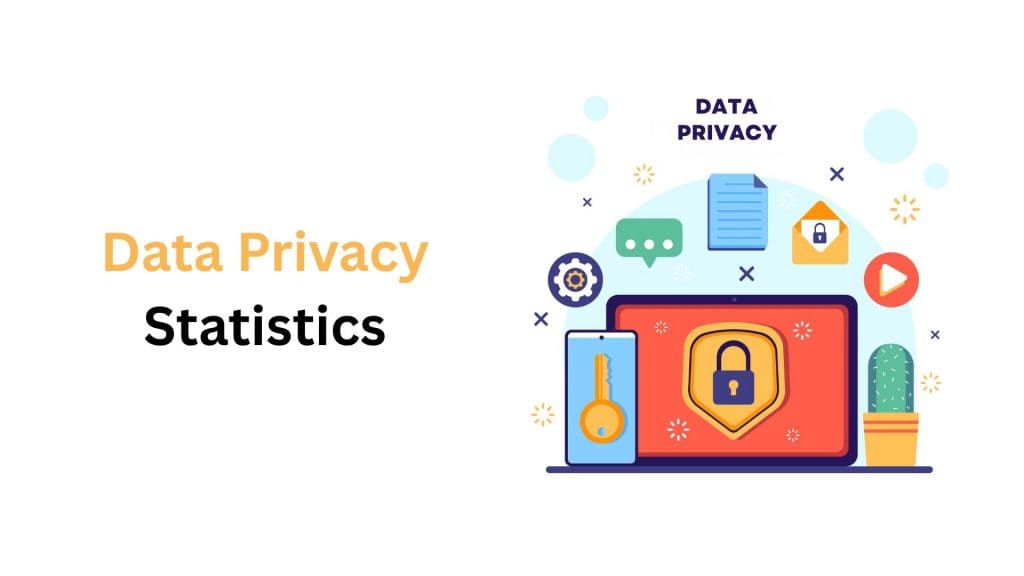Introduction
Data Privacy Statistics: The focus on data privacy has changed from a niche regulatory topic to a vital global imperative. The overall volume of personal and sensitive data generated daily makes protecting this information a task for everyone involved: individuals, corporations, and governments.
These insights presented here offer a stark, quantitative look at the current state of data privacy, revealing the financial realities of breaches, the complexities of compliance, and the rapidly evolving concerns driven by technologies like Artificial Intelligence. I’d like to discuss data privacy further, providing the essential statistics that are changing the future of digital authenticity. Let’s get into the data.
Editor’s Choice
- The average cost of a data breach globally in 2025 has been measured at a substantial $4.44 million, confirming that cyber incidents remain a critical financial threat.
- The United States continues to bear the highest financial burden for data compromise, with its average breach cost surging to a record-breaking $10.22 million, which is now 40% higher than the next most expensive region globally.
- A striking 81% of US adults are of the firm belief that the personal information companies collect about them will ultimately be used in ways they find uncomfortable.
- By the close of 2024, an estimated 79% of the global population is covered by modern data privacy
- Healthcare organizations face the most severe financial risk, with their average data breach cost soaring to $10.93 million.
- The emergence of unmanaged “Shadow AI” within an organization is projected to add an astronomical $17.9 million to the final cost of a data breach.
- A significant majority, approximately 60% of all data breaches, are directly attributed to human element issues.
- Organizations report a favorable financial outcome from their compliance efforts, estimating an average 6x return on investment (ROI) for every dollar spent on data privacy, with three out of ten companies reporting an even higher 2x ROI.
- A crucial 48% of consumers have already taken the decisive step of completely abandoning a company or service due to unaddressed data privacy
- The average time it takes organizations to identify a data breach stood at 194 days in 2024, indicating that the initial detection phase remains a protracted vulnerability that significantly increases the total lifecycle and cost of an incident.
- Enforcement actions have escalated severely, with the largest single GDPR fine to date reaching a massive €1.2 billion.
- Despite regulatory pressures, a commanding 78% of firms report experiencing no negative business effects from complying with data privacy regulations.
Data Privacy Trends
- According to TrustArc, about 92% of Americans worry about their privacy when using the internet.
- As stated by IBM, nearly 44% of data breaches involve personal customer details such as names, emails, and passwords.
- Findings from LegalJobsIO show that 67% of Americans are unaware of their nation’s privacy and data protection laws.
- A Google/Harris Poll found that 60% of U.S. adults do not know the meaning of the term “phishing.”
- Based on a Pew Research Center survey, 62% of Americans believe it is impossible to live daily life without companies collecting their data.
- The Global Consumer State of Mind Report 2021 revealed that 76% of users think companies should do more to safeguard their data online.
- According to KPMG, about 60% of consumers believe companies regularly misuse their personal data.
- The same KPMG study reported that 68% of consumers are worried about the volume of data collected by businesses.
- Data from Data Prot showed that only 3% of Americans understand how online privacy laws actually work in their country.
- As per Statista, 58% of users are willing to share personal data if it allows them to access online content for free.
- Research by MAGNA/Ketch found that only 5% of consumers have no serious concerns about how organizations handle their personal information.
- The same study also indicated that just 21% of consumers feel confident their data is used for legitimate purposes.
- According to The Hacker News, 45% of third-party apps access sensitive user information without valid justification.
- A report by Tableau revealed that 54% of consumers believe most companies fail to use their data in ways that benefit them.
- According to industry data, only 26.5% of organizations were data-driven in 2022, and this number declined to 23.9% in 2023.
Online Privacy Statistics
- According to Surfshark, about 9 in 10 U.S. internet users agree that protecting personal information online is important. However, around 75% believe they are vulnerable to cyberattacks. Despite this awareness, only 64% use privacy protection tools, and just 56% feel in control of their data.
- Norton reports that 85% of global adults want to take more action to protect their online privacy. In a survey of 10,000 adults across 10 countries, it was found that 80% are concerned about privacy, 69% are more concerned than before, and 61% willingly give up privacy for convenience.
- The same Norton survey revealed that 55% believe full privacy protection is impossible, and 51% admit they do not know how to safeguard their personal data.
- Around 7 in 10 global adults have already taken steps to enhance their privacy. According to Norton, 29% have changed default privacy settings, 26% have enabled multi-factor authentication, 26% have disabled third-party cookies, and 16% have started using VPNs.
- A Pew Research report shows that 62% of Americans believe it is impossible to live daily life without companies collecting their data, while 63% say the same about government collection. Around 79% are worried about how companies use their information, and 64% express concern about government use of personal data.
- According to Pew Research, about 1 in 4 Americans are asked to agree to a privacy policy every day. 57% face them weekly, and 81% at least once a month. Only 22% of people read these policies completely.
- Surfshark’s findings indicate that antivirus software is the most common privacy protection tool, used by around 3 in 5 internet users. Meanwhile, 39% use ad blockers, 36% use password managers, 17% rely on encrypted email, 15% use encrypted messaging apps, and 14% use paid VPN services.
Consumer Data Privacy Statistics
- According to YouGov, nearly two-thirds of global consumers believe that technology companies exert too much control over their personal data. This sentiment is particularly strong in countries like the UK and Spain, where around 75% of adults express concern about how tech companies manage their information.
- The perception of excessive data control differs by age group. Approximately 70% of Baby Boomers feel that tech companies control too much of their data, while only 59% of Gen Z share this concern.
- Gartner reports that consumers are selective about the types of data they deem acceptable for brands to collect. About 80% believe it is acceptable for brands to collect purchase history, while 77% agree that gathering user-provided personal preferences is reasonable. Meanwhile, around 67% approve of collecting basic demographic data.
- Conversely, only 34% of consumers think it is appropriate for companies to collect browsing history. Even fewer are comfortable with the collection of employment and financial information (29%) or personal health data (27%).
- According to Netwrix, approximately 4 in 5 companies store sensitive data in the cloud, and around 44% use cloud systems for customer and employee data storage.
- The same report reveals that 69% of companies rely on multi-factor authentication (MFA) as their primary method of protecting cloud data. Additionally, 63% utilize cloud backups, and 62% implement encryption for added security.
- Netwrix also notes that 55% of IT professionals identify hackers as the primary threat to cloud data security. Other significant risks include employees (39%) and contractors or business partners (36%), who may unintentionally or intentionally compromise data security.
- According to Cisco, nearly 47% of adults in 12 countries have severed their relationship with a company due to dissatisfaction with its data privacy practices. About 33% stopped using social media platforms, 28% left internet service providers, and 23% discontinued services from phone companies for similar reasons.
- As reported by Insider Intelligence, trust in Facebook remains low in the United States. Although the platform boasts over 230 million users, fewer than 45 million believe that Facebook adequately protects their personal information. In 2021, the trust level was recorded at 27%, indicating a declining trend in confidence among U.S. users.
The Financial Reality of Data Breaches and Data Privacy Risks
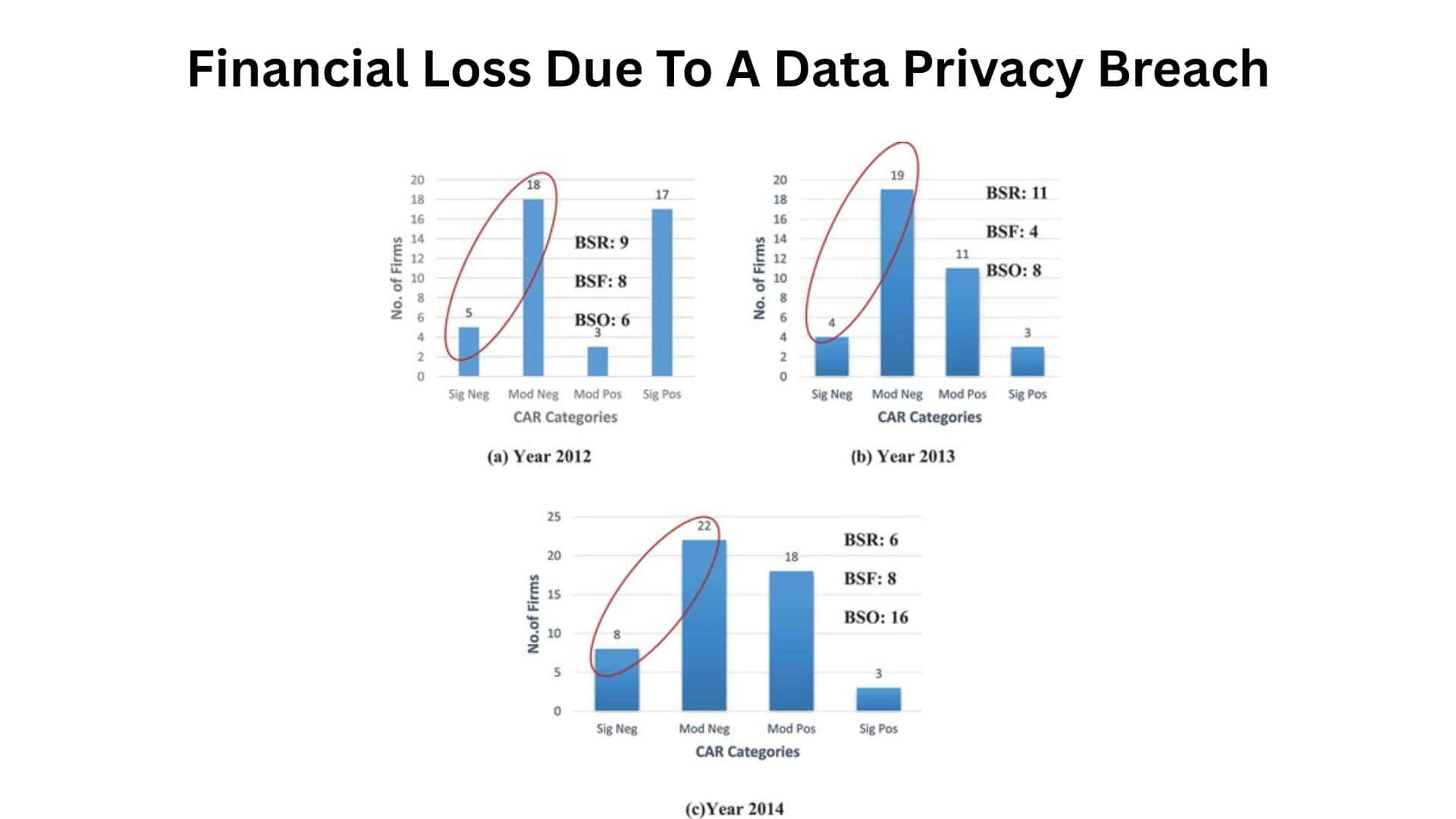 (Source: tandfonline.com)
(Source: tandfonline.com)
- The global average cost of a data breach in 2025 stands at $4.44 million, which, while representing a slight 9% decrease from the all-time high recorded in 2024.
- The United States bears the most significant financial burden, with the average cost of a data breach surging to a record-breaking $10.22 million, marking the 15th consecutive year the country has held the highest average breach cost worldwide.
- The highly sensitive nature of patient records and strict regulatory penalties mean that the Healthcare sector has recorded the highest average breach cost for 14 years in a row, with a current figure of $10.93 million per incident.
- Breaches that have a lifecycle, the time from identification to containment, exceeding the 200-day mark cost organizations an average of $5.01 million, which is $1.14 million more than breaches contained in less than 200 days.
- In terms of specific data types, compromised or stolen intellectual property (IP) is the most costly record, fetching an average cost of $178 per record, eclipsing the cost of customer PII ($160 per record) and employee PII ($168 per record).
- Human element issues, which encompass employee errors and system misuse, are responsible for a massive 60% of all data breaches.
- Third-party vendor and supply chain compromises have solidified their position as the second most costly attack vector, reaching an average expense of $4.91 million per incident.
- Organizations that proactively use security AI and automation save an average of $1.76 million on data breach costs compared to those that do not.
- The costs incurred for detection and escalation, covering forensic and investigative activities and crisis management, averaged $1.47 million in 2025.
- Breach notification costs, the expense of informing affected individuals, have dropped by nearly 10% in 2025, falling from $430,000 in 2024 to an average of $390,000 this year.
- Globally, the cost of cybercrime is projected to grow at an annual rate of 15% and is estimated to hit an astronomical $10.5 trillion by 2025.
- The average time taken to identify a data breach globally stood at 194 days in 2024.
| Financial Indicator | Global Average (2025) | Highest Regional Average (US 2025) | Most Expensive Industry (2025) |
| Total Cost of Data Breach | $4.44 million | $10.22 million |
Healthcare: $10.93 million |
|
Cost per Record (IP) |
$178 | N/A | N/A |
| Breaches with Human Element | 60% | N/A |
N/A |
|
Breach Lifecycle 200 Days |
$5.01 million | N/A |
N/A |
Consumer Trust, Behavior, and the Perception of Data Privacy
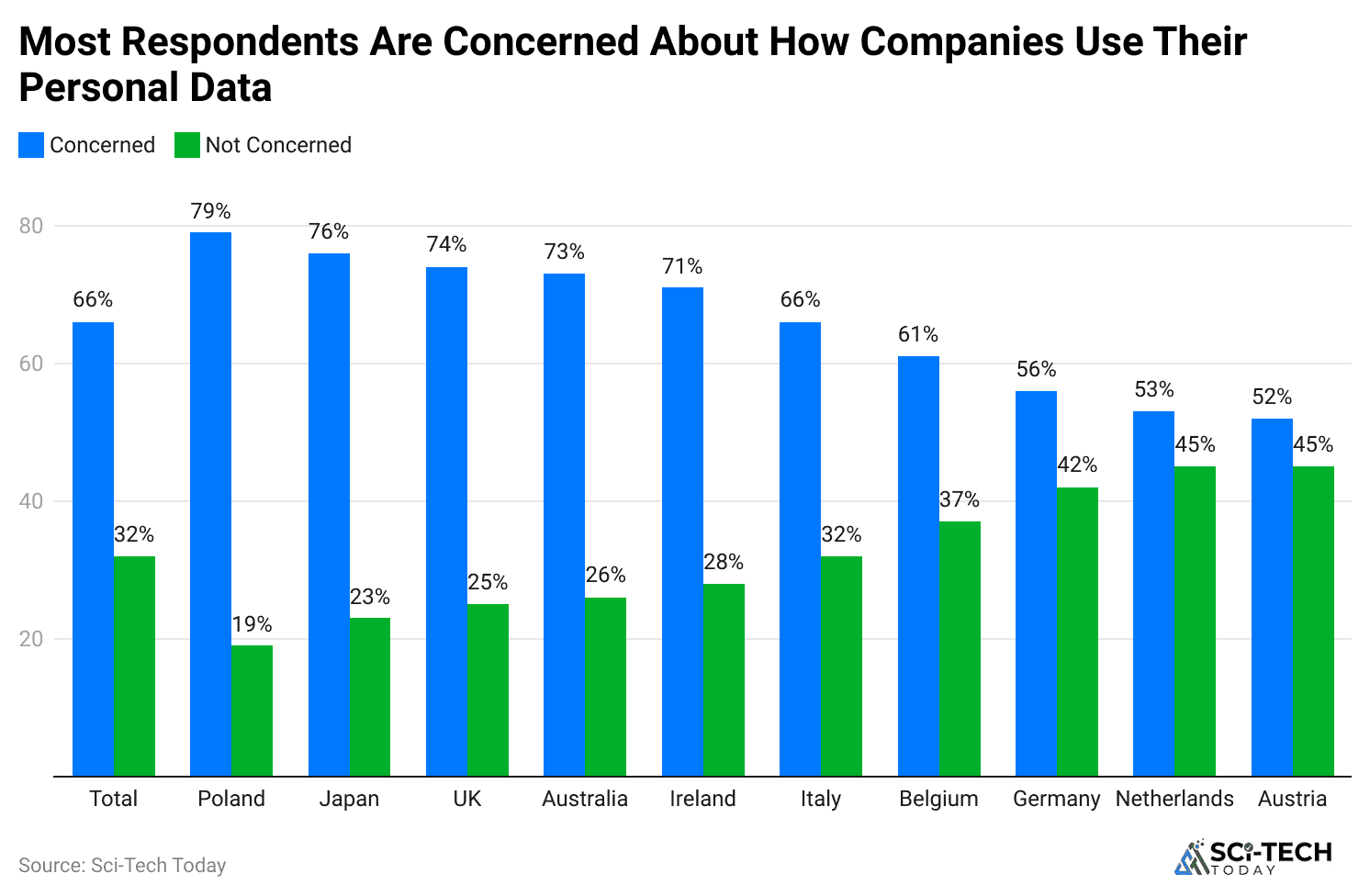 (Reference: deloitte.com)
(Reference: deloitte.com)
- 81% of US adults express the belief that the information collected by companies will be used in ways they find uncomfortable or inappropriate.
- Around 68% of global consumers report being either somewhat or very concerned about their online data privacy.
- The desire for stronger safeguards is evident, with 87% of users wanting to have definitive control over how and what personal information companies utilize.
- A significant 48% of consumers have taken the ultimate step of stopping a purchase or ending a relationship with a company entirely due to privacy concerns.
- Only 40% of US consumers explicitly trust companies to use their data ethically.
- Roughly 63% of global consumers feel that most companies are still failing to be transparent about exactly how their data is being used, a major contributor to the current trust deficit.
- The perception of governmental use of data is also low, with 71% of US adults expressing worry about how their own government manages and utilizes their personal data.
- Despite the high level of concern, over half of the US population, roughly 56%, admit to frequently or always clicking “agree” to privacy policies and terms of service without actually reading the content.
- When a company is breached, a majority of Americans, approximately 64%, place the blame for the loss of personal data squarely on the company itself rather than the external hacker.
- Globally, 84% of users report being more loyal to companies that have demonstrably strong security controls in place
- Just 29% of consumers find it easy to understand the level of data protection a company provides.
- Over two-thirds of adults, specifically 68%, are becoming proactive about their data privacy by taking steps like changing default privacy settings on their devices.
| Consumer Behavior | Percentage of Global/US Consumers |
| Discomfort with Data Use | 81% (US Adults) |
| Stopped Buying Due to Privacy | 48% (Global/US) |
| Lack of Corporate Transparency | 63% (Global) |
| Worry about Online Privacy | 68% (Global) |
Data Privacy and Consumer Behavior Statistics
- According to McKinsey, 71% of consumers said they would stop doing business with a company if their personal data were mishandled.
- Cisco reported that 94% of organizations believe customers would not buy from them if they failed to protect personal data properly.
- The International Association of Privacy Professionals found that 68% of consumers worldwide feel concerned about their online privacy.
- As per KPMG, 86% of Americans consider data privacy an increasing concern in their daily lives.
- KPMG also reported that 40% of U.S. consumers do not trust companies to use their data ethically.
- According to the Pew Research Center, only 21% of U.S. adults are confident that those with access to their data will act responsibly.
- Pew Research Center further revealed that 81% of adults believe companies use their collected data in ways that make them uncomfortable.
- Around 80% of U.S. adults, as reported by Pew Research Center, think their data is used for purposes other than originally intended.
- Norton found that 85% of global adults wish to take extra steps to protect their privacy online.
- Pew Research Center highlighted that while 78% of adults trust themselves to manage personal data, 61% believe their efforts make little difference.
- McKinsey reported that U.S. consumers trust healthcare and financial services the most with their data, while media and entertainment sectors are the least trusted.
- According to McKinsey, 50% of consumers are more likely to trust companies that only request necessary personal information.
- KPMG stated that 48% of Americans feel more comfortable sharing data if it is made completely anonymous.
- The International Association of Privacy Professionals noted that 33% of consumers lose trust in companies that share their data with third parties.
- Pew Research Center revealed that 61% of users believe privacy policies fail to explain how data is used, and 69% see them as barriers to get past.
- About 56% of Americans, according to Pew Research Center, admit they often agree to privacy policies without reading them.
- The International Association of Privacy Professionals found that only 29% of consumers find it easy to understand how well companies protect their personal data.
- According to the same association, 64% of consumers say companies earn their trust when they clearly explain privacy policies.
- KPMG discovered that 76% of Americans want more transparency about how companies use personal data.
- Furthermore, KPMG reported that 40% of Americans would share data if they understood how it would be used, yet only 53% of companies have made this clear.
- Cisco reported that 77% of consumers believe transparency about data collection helps build trust, but only 21% of organizations provide clear explanations.
- According to Salesforce, 54% of users find it harder than ever for companies to earn their trust.
- IBM reported that 44% of data breaches involve personal information such as names, emails, and passwords.
- Termly stated that 91.1% of businesses would prioritize data privacy if they knew it would strengthen customer trust and loyalty.
- Tableau reported that 63% of users believe most companies are not transparent about how they use data.
- As per Salesforce, 84% of users remain more loyal to companies that have strong security controls.
- Pew Research Center found that 52% of Americans have avoided products or services because of concerns about data collection.
The Global Regulatory Landscape and Data Privacy Compliance
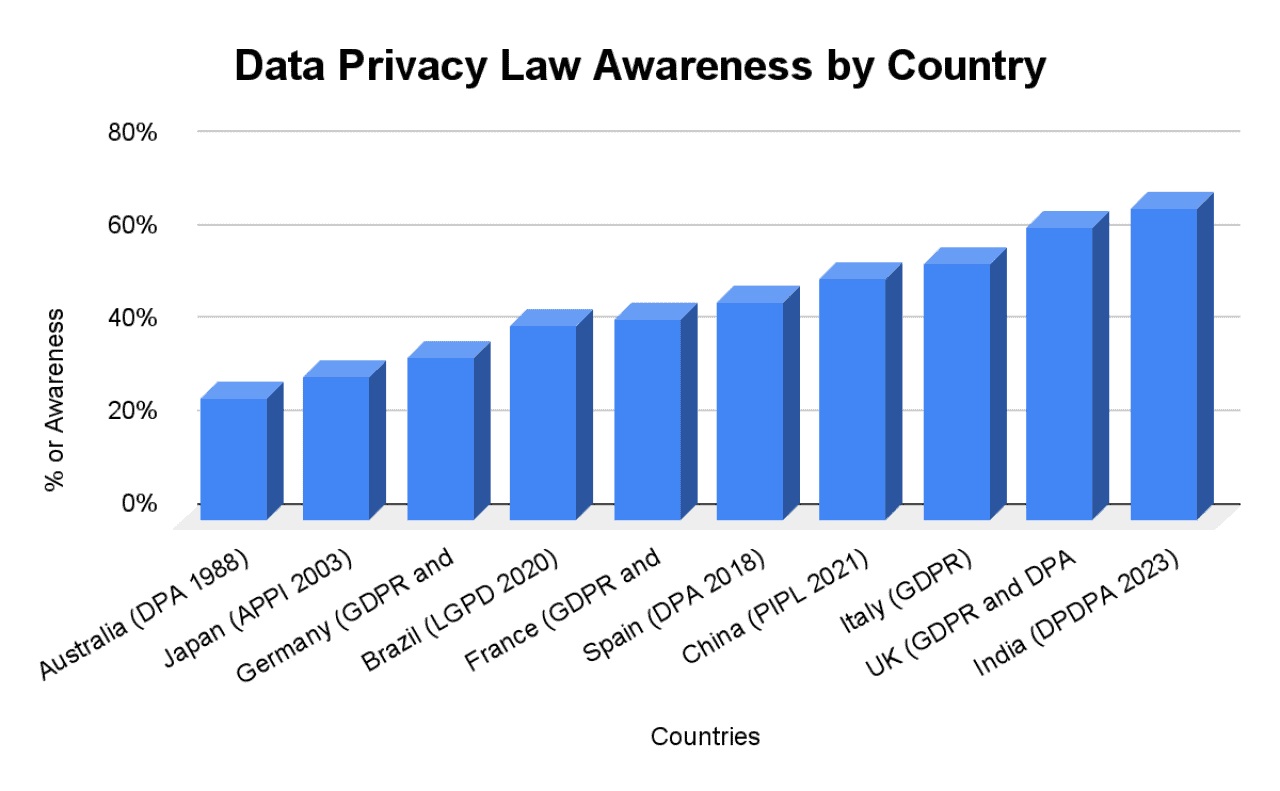 (Source: edgedelta.com)
(Source: edgedelta.com)
- A monumental shift in global governance is evident, with 71% of countries worldwide having now implemented some form of national data protection and data privacy legislation, up from just 10% in 2020.
- By 2025, it is projected that 65% of the world’s population will have their personal data officially covered by modern privacy regulations.
- As of 2025, there are now 144 countries that have established and enacted national data and consumer data privacy laws.
- The General Data Protection Regulation (GDPR) has served as the global template, with at least 20 non-EU countries having enacted laws directly modeled after the GDPR’s principles of consent.
- Over the period spanning 2018 to 2025, the total sum of administrative fines issued for GDPR violations has soared to over €4 billion.
- The largest single GDPR fine to date, a record-breaking €1.2 billion sanction, was levied against Meta Platforms Ireland Limited in 2023 for improperly transferring Facebook user data from the EU to the US without adequate safeguards.
- Violations related to the general principles for data processing and having an insufficient legal basis for data processing are responsible for the largest portion of the highest financial penalties levied under GDPR.
- A significant 88% of organizations surveyed reported spending more than $1 million annually to maintain continuous GDPR compliance, with over 40% spending in excess of $10 million.
- The European Union has demonstrated a heightened focus on Big Tech, imposing fines totaling over $3.1 billion on the five most popular social media sites in 2023 for various data privacy violations.
- The average fine imposed across all countries in the 2018-2025 period for GDPR non-compliance reached €2,360,409.
- Around 72.9% of businesses now actively utilize dedicated compliance solutions and technological tools to help them effectively meet the complex and evolving requirements of various data privacy laws.
- Only a small fraction, approximately 25% of consumers, have actively exercised their data subject access rights (DSARs) by requesting a copy of the data a company holds on them.
| Regulatory Data Point | Quantitative Value |
| Global Population Covered by Law | 65% (by 2025) |
| Total GDPR Fines (2018-2025) | €4 billion |
| Largest Single GDPR Fine | €1.2 billion |
| Organizations Spending $1M on GDPR | 88% |
The Intersection of AI and Data Privacy
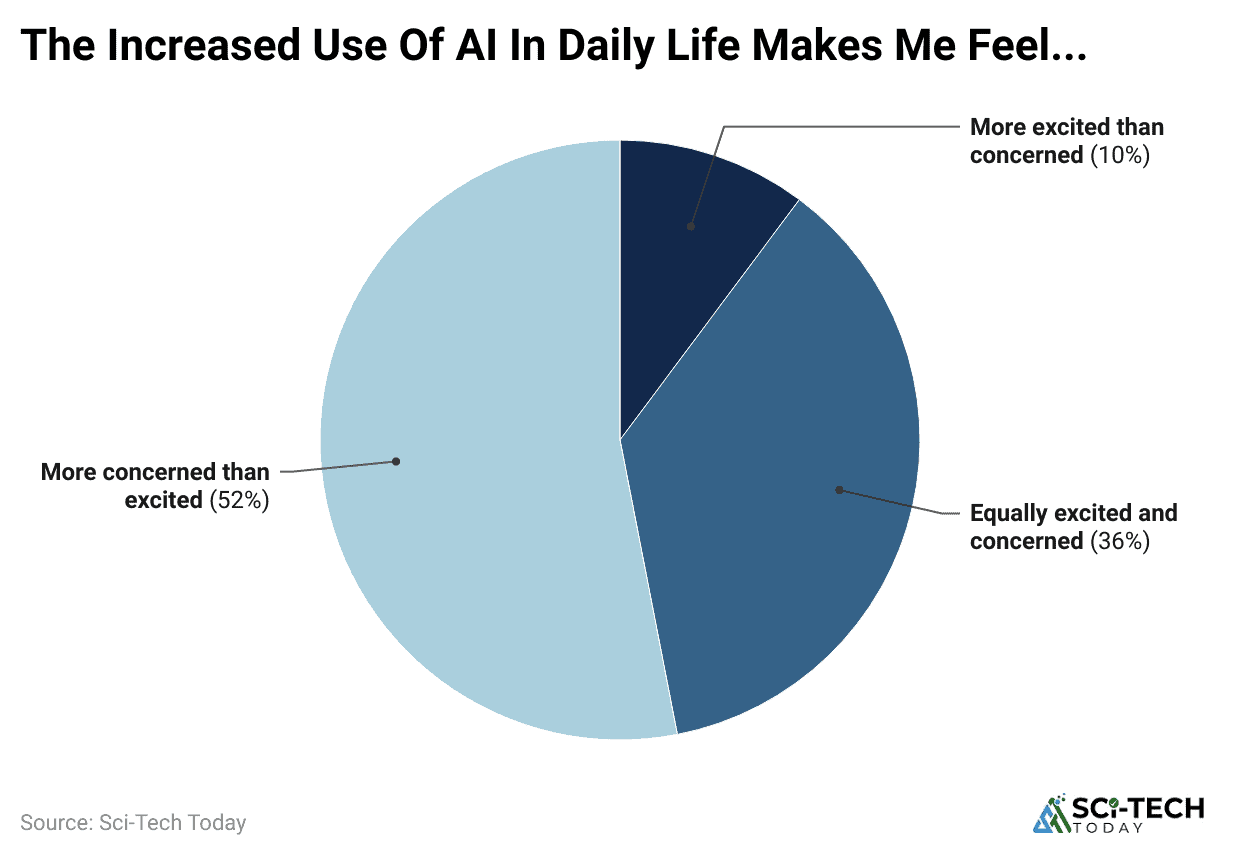 (Reference: iapp.org)
(Reference: iapp.org)
- A substantial 57% of consumers globally agree that the use of AI to collect and process their personal data poses a significant threat to their fundamental privacy rights.
- An overwhelming 70% of Americans report having little to no trust in corporations to make them responsible.
- The hidden, unmanaged deployment of AI systems, referred to as “Shadow AI,” is a financial risk, with its presence projected to add nearly $17.9 million to the average cost of a data breach.
- Only 24% of companies express any confidence in their ability to manage the unique data privacy concerns and associated risks that arise from their use of AI-driven systems.
- The majority of organizations, 63%, have been forced to implement restrictions on the types of data that can be input into their Generative AI tools to prevent the accidental or unauthorized exposure of sensitive company information.
- Despite the risks, a shocking 48% of organizations have already admitted to inputting non-public, company-confidential data directly into GenAI applications.
- The top three types of confidential information being entered into GenAI tools are: 43% internal business data, 31% source code, and 12% personally identifiable information (PII), all of which represent high-value targets.
- A clear disconnect exists, as 82% of enterprise executives state that ethical AI design is essential, but fewer than 25% have actually implemented internal policies or governance to enforce this ethical stance.
- On the positive side, 67% of organizations now incorporate AI and automation directly into their security operations.
- A study indicated that 40% of organizations have already faced a privacy breach directly related to the implementation and operation of an AI system.
- More than two-thirds, 62% of consumers, would place greater trust in a company whose AI interactions are transparent and actively respect their data privacy rights.
| AI and Data Privacy Metric | Quantitative Value |
| Consumer View of AI as Privacy Threat | 57% (Global) |
| Cost Added by “Shadow AI” to Breach | $17.9 million |
| Organizations Confident in AI Privacy | 24% |
| Confidential Data Input to GenAI | 48% |
Data Privacy and AI Statistics
- According to Gartner, 40% of organizations have faced privacy breaches involving artificial intelligence systems.
- The International Association of Privacy Professionals reported that 57% of global consumers see AI-based personal data collection and processing as a serious privacy threat.
- As per the Pew Research Center, 70% of adults in the United States have little or no trust in companies to make responsible decisions about AI use in their products.
- Cisco reported that 91% of organizations believe they need to improve customer reassurance about how their data is handled when AI is involved.
- According to Cisco, 48% of organizations are entering confidential company information into generative AI applications.
- Findings from LayerX revealed that 15% of employees regularly post company data into ChatGPT, and over one-fourth of that data contains sensitive information.
- LayerX also found that 4% of employees paste sensitive data into generative AI tools every week.
- The same report by LayerX indicated that the most common types of confidential data entered into generative AI tools are internal business data (43%), source code (31%), and personally identifiable information (12%).
- According to ISACA, 48% of respondents from enterprises earning under $50 million annually stated they had no plans to use AI for privacy-related functions, compared to 24% of large enterprises with revenue above $1 billion. This reflects that smaller enterprises may lack the resources for proper AI governance.
- Cisco reported that 63% of organizations restrict the types of data allowed in generative AI tools, 61% limit which tools can be used, and 27% have completely banned generative AI tools.
Data Privacy as a Business Investment
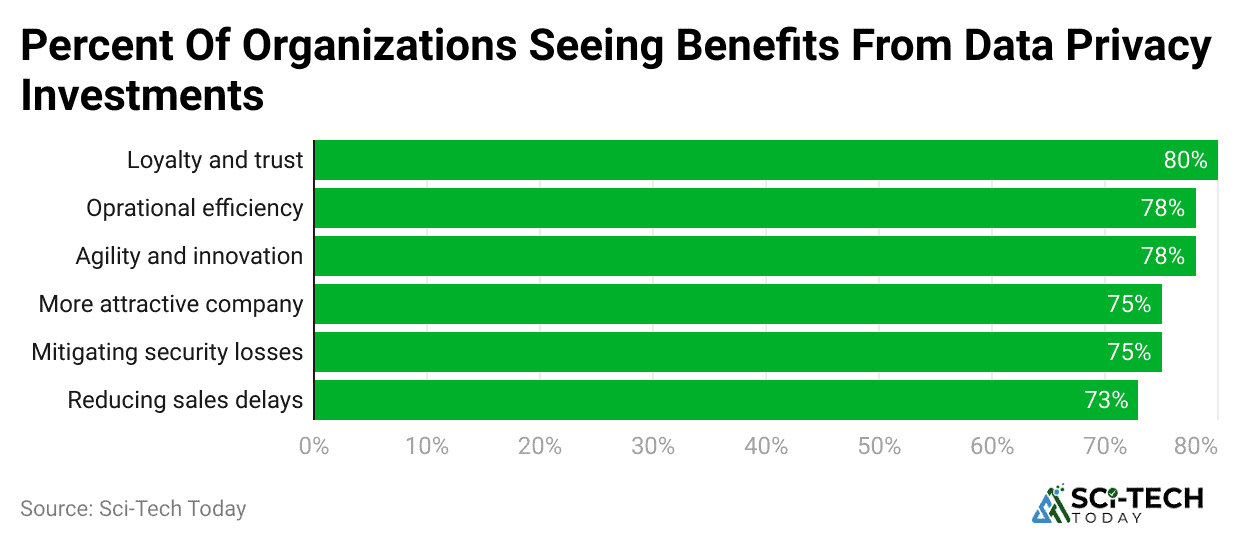 (Reference: secureframe.com)
(Reference: secureframe.com)
- A definitive 95% of organizations now firmly assert that the overall benefits derived from investing in enhanced data privacy measures substantially outweigh the direct costs of implementation.
- The average organization estimates they receive a significant 1.6x return on investment (ROI) for every dollar they allocate toward data privacy initiatives, with 30% of companies reporting an even higher 2x ROI.
- A massive 97% of organizations now acknowledge an explicit responsibility to handle consumer data ethically, a significant increase from just 92% a few years prior.
- A strong majority, 78% of firms, have explicitly reported experiencing no negative business effects as a result of complying with global data privacy regulations.
- 80% of organizations report that they observe a tangible increase in both customer loyalty and overall trust as a direct.
- Beyond customer-facing benefits, 78% of businesses also note significant internal improvements, including enhanced operational efficiency.
- The long-term financial commitment to data protection is clear, with total spending on data privacy across organizations having more than doubled over the last five years.
- It is projected that by the close of 2024, large-scale organizations will be allocating an annual budget exceeding $2.5 million specifically to fund their various data privacy and protection initiatives.
- Nearly 93% of organizations consider data privacy to be one of their top ten organizational risks, with an elevated 36% ranking it among their five most critical business risks.
- Despite the high prioritization, only 50% of organizations currently possess a formally defined and well-articulated privacy risk appetite.
- A quarter of employees, specifically 25%, report feeling that their current workplace does not place a high enough priority on data privacy and security.
| Data Privacy Investment Indicator | Quantitative Value |
| Organizations with Positive ROI | 95% |
| Average Return on Investment (ROI) | 1.6x |
| Observed Customer Loyalty Increase | 80% |
| Reported Operational Improvement | 78% |
Conclusion
Overall, the landscape of data privacy makes one thing unequivocally clear: we are past the point of treating data protection as an afterthought. The figures, from the $10.22 million average breach cost in the US to the €1.2 billion single GDPR fine, quantify the severe financial consequences of non-compliance and poor security. Concurrently, the consumer statistics, that 81% of US adults express discomfort with corporate data use.
The rise of AI has introduced complex, multi-million-dollar risks, as evidenced by the $17.9 million cost increase tied to “Shadow AI.” Yet, the data also shows a clear path forward: with 95% of organizations seeing a positive ROI and an average return of 1.6x on their data privacy investments, treating privacy as a revenue-driving asset is the only sustainable business model. So these are all the data that we have collected. I hope you find this article useful. If you have any questions, kindly let us know. Thanks for staying up till the end. I appreciate your effort.

